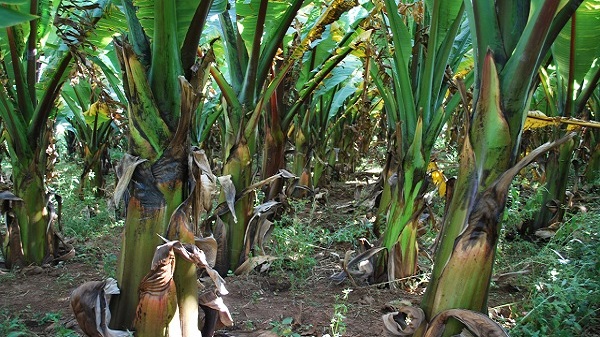
Women often determine which varieties of enset are planted, and they are usually the ones who sell kocho at the market.
By Jacqueline Turner (The Daily Beast)
At first glance, Ensete ventricosum may look like a banana plant, with huge green fronds and a towering, thick brown pseudostem. But if you peel these orange, banana-cousin fruits, watch out: Instead of a pale, mushy interior, this banana-like fruit consists almost entirely of large, teeth-cracking, black seeds.
E. ventricosum, colloquially known as “enset,” has gained such a reputation for its misleading fruit that it is often called “the false banana.”
And yet, enset feeds 20 million people in Ethiopia. Those who cultivate this banana cousin often grow dozens of these plants in fields very close to their homes. When the time comes to harvest an enset plant—usually when the plant is six or seven years old and just before it flowers—a farmer will cut it down, chop up part of the root, scrape out the inside of the stem, and massage these plant chunks by hand into a pulp. This pulp is then left to ferment inside of a leaf-lined pit. The final product is called “kocho,” and it can be served as a porridge-like dish, with meat or milk, or pounded into a kind of bread.
One of the most interesting and important facts surrounding enset’s odd and complex transformation is the fact that most of the people who prepare enset and sell enset are women. Women often determine which varieties of enset are planted, and they are usually the ones who sell kocho at the market. This makes this crop incredibly important to livelihoods, especially to families where women are the head of the household.
Agricultural and aid organizations often push crops such as maize and wheat when it comes to small-scale farms, but in a country frequently in the news for drought, these crops often don’t fare well. However, some believe that enset is drought-resistant. With the climate increasingly changing in East Africa, and potentially becoming much drier, enset could come to provide nutrition for many more farmers in Ethiopia.
Read the complete story at The Daily Beast
——
See also:
- Ethiopia’s Sacred Forests Are Shrinking. Can He Save Them?
- Significant Step to Realize Ethiopia’s Ambitious Forest Restoration Plan
- The Rising Costs of Animal-source Foods in Ethiopia: Evidence and Implications
- Calls for Bridging Legal Framework Gaps to Transform Self-Help Groups (SHGs)
- Land Restoration in Ethiopia: ‘This place was abandoned… This is incredible to me’
